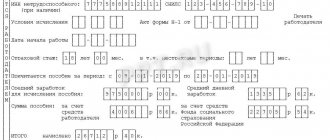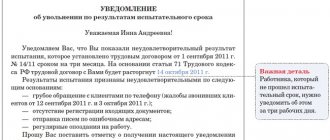What awaits the employer after dismissal is declared illegal?
Term and procedure for reinstatement of an employee
Court decision in case of unwillingness of the employee to continue working
Consequences of failure to comply with a court decision on reinstatement at work
Compensation for forced absence
Compensation for moral damage
Administrative and criminal liability of the employer
What happens if the court decision on reinstatement is overturned?
What awaits the employer after dismissal is declared illegal?
Recognition of dismissal as not in accordance with the law threatens the employer with the following adverse consequences:
- Reinstatement of the employee to his position if he wishes to continue working for this employer.
- Payment to an employee of compensation for forced absence.
- Compensation for moral damage to the employee.
- Administrative liability for violation of labor laws.
In some cases, criminal liability for illegal dismissal of an employee is possible. It is established for those who fired a woman because she was pregnant or had a small child under the age of 3 (Article 145 of the Criminal Code of the Russian Federation).
Note that for the first three consequences to occur, there must be a court decision in favor of the employee. Neither the labor dispute commission, nor the prosecutor's office, nor the labor inspectorate have the authority to reinstate employees after illegal dismissal or force employers to make payments.
At the same time, the employee has very little time to challenge the dismissal - a month from the moment he becomes familiar with the relevant order of the employer. We recommend reading our feature article on the statute of limitations for this category of disputes.
https://youtu.be/PpYDf48HDmc
What is illegal dismissal?
In order to start talking about illegal dismissal, you must first describe the dismissal procedure itself. So, dismissal is the termination of the employment contract between management and employee . Dismissal can take many different forms, and it is not always a negative event. We list the most standard reasons for dismissal:
- The temporary contract has come to an end;
- The employee submitted a voluntary request;
- There was a staff reduction;
- There was a closure of the enterprise;
- The employee committed theft;
- The employee violated safety regulations;
- An employee has damaged the organization’s property;
- The employee stopped coming to work;
- The employee came to work under the influence of alcohol or drugs.
All these reasons are to some extent logical and obvious: why keep an employee if he does not want to continue to cooperate or fulfill his duties? Due to the fact that in these cases there are grounds for termination of work, the dismissal will not be considered illegal.
Now let's move on to the illegal dismissals themselves. Unlawful dismissal is the process of terminating an employment contract, carried out by mistake, with serious violations, or completely unlawful. Some cases of lawful dismissal that violate the rules may also be considered illegal dismissal. So, in short, illegal dismissal is the process of dismissing an employee that violates some points of the Labor Code of the Russian Federation . However, the methods of illegal dismissal themselves are extremely varied. For convenience, we will divide them into categories: dismissal in violation of the Labor Code of the Russian Federation, in violation of the dismissal procedure itself, with special conditions for violating norms.
Dismissal in violation of the Labor Code of the Russian Federation
The most common type of illegal dismissal. It includes all those cases when an employee is simply kicked out without a legal reason. It should be remembered that the labor code sets clear conditions for termination of an employment contract, and their violation will also be considered a violation of Russian laws .
For simplicity, let's look at an example. The seasonal worker was required to terminate cooperation with the employer before the start of the autumn season. However, the employer, considering that his services would no longer be needed, decided to fire the employee two weeks earlier in order to save money. As a result, the next day, instead of the employee’s workplace, they are sent to the accounting department for calculations and documents. Such a dismissal will be considered illegal, since it violates several norms described in the Labor Code of the Russian Federation: the general procedure for dismissal (the employee was dismissed from his position without justification of the reason), the procedure for drawing up fixed-term contracts (they must terminate on a certain day) and several other, less significant rules.
This example makes it clear enough what illegal dismissal is. However, the reasons can be very different - from the manager’s hostility towards the employee to a deliberate violation of the rules of the Labor Code of the Russian Federation in order to remove an unnecessary employee.
Violation of dismissal rules
One of the forms of illegal dismissal is considered to be cases when the dismissal itself is carried out with errors. The standard procedure should be as follows:
- An employee is informed of his dismissal
- The employee receives the order and gets acquainted with it;
- Accounting provides the employee with a full calculation of salaries, compensation and other payments;
- The HR department issues the employee his documents.
Problems can arise at each stage. The employee may forget to warn about the impending dismissal within the period established by the Labor Code of the Russian Federation or the contract; he may not be allowed to familiarize himself with the order. It is also very likely that part of the employee’s funds may be withheld during settlement. Such cases of dismissal will generally be considered illegal.
Violation of special conditions
The Labor Code of the Russian Federation has many exceptions, additions and rules that go against the basic structure. It makes no sense to consider them all, so let's just look at an example. Let’s take a situation: a single mother with many children was laid off and was fired. This is a real illegal dismissal, since the law prohibits laying off such employees ( they can only be transferred to other positions or to another place of work ).
There are hundreds of such exceptions, and all of them are illegal. There are only two good facts - most often they are due to errors in the papers and are eliminated by the employer himself without any problems, and they are also quite easy to challenge during verification.
Term and procedure for reinstatement of an employee
As a general rule, the court issues writs of execution only after the decision has entered into force. And this is 30 days from the date of production of the judicial act in final form. But in cases of reinstatement, everything is different. Decisions in favor of the employee must be executed immediately, therefore the court issues a writ of execution immediately, without waiting for the decision to enter into force (Article 396 of the Labor Code of the Russian Federation, paragraph 1 of Part 1 of Article 428 of the Code of Civil Procedure of the Russian Federation).
You can find more complete information on the topic in ConsultantPlus. Full and free access to the system for 2 days.
At the request of the employee, the court itself may send a writ of execution to the FSSP.
The period for reinstatement at work in case of illegal dismissal is one day from the moment the employer receives a copy of the bailiff’s resolution to initiate proceedings (Part 1, Article 105 of the Law “On Enforcement Proceedings” dated October 2, 2007 No. 229-FZ, hereinafter referred to as Law No. 229).
The employer will be considered to have complied with the court decision if he has carried out two actions:
- canceled the dismissal order;
- allowed the employee to perform official duties.
If, according to the law, in order to start work, additional measures are required, for example, obtaining access to state secrets or passing a medical examination, the employer must take measures to carry out such measures.
Where and when to contact
Every person working in a hired job may face illegal dismissal at his own request or under a fabricated article of the Labor Code. To avoid negative consequences and loss of earnings, you need to know what to do if you were illegally fired from your job.
The enterprise administration is well aware that the level of legal knowledge of an ordinary employee may be very low. Many simply do not know who to turn to if they were fired illegally.
In fact, there are three bodies that are obliged to help the employee achieve justice if the victim manages to prove the fact of violations:
- Labor Inspectorate. Any employee who has suffered from unlawful actions on the part of management has the right to write a statement to the inspectorate with a request to look into the situation. An investigation is ordered within 10 days, which will result in an order to reinstate the dismissed person.
- Prosecutor's office. The procedure for contacting the authority is similar - based on the submitted application, an investigation is organized. Identification by the prosecutor's office of illegal dismissal is a reason to initiate a case or redirect it to a labor inspector. A 30-day period has been allotted for the trial.
- Judicial authority. The statement of claim is prepared and filed at the location of the organization from whose leadership the person suffered. Conducting a trial and finding in favor of the plaintiff is the most effective way to obtain justice. The only difficulty is preparing a comprehensive evidence base and legally competent drafting of the claim.
It is recommended to involve a lawyer or a lawyer specializing in labor disputes, who will draw up a statement of claim in case of illegal dismissal of an employee.
Download the Sample Statement of Claim to declare the dismissal illegal (32.5 KiB, 110 hits)
The law does not limit the right to contact all organizations at once to call violators to account. A decision by any of the authorities in favor of the employee obliges the administration to return the person and reinstate him in the right to work, in his position with the previous salary.
At the same time, the employer has the right to defend himself during the trial, presenting his own arguments and evidence. If the court's decision does not satisfy the management, it will use the provided period of appeal. Illegal dismissal will have to be proven to a higher authority.
It is important to remember that you only have 1 month to appeal the manager’s decision. Only if it can be proven that the employee was not notified of the dismissal can the deadline for filing a complaint be restored.
You should not hope that any citizen who asks for help will be reinstated. Allegations of wrongdoing are not suitable for holding those responsible to account. As soon as the company fires an employee, it is necessary to request a full package of papers indicating the dismissal and the grounds for this. Upon request, the employer issues documentation within three days.
Since difficult situations are rarely resolved without a trial, it is necessary to know the specifics of labor dispute litigation. The manager, when committing violations, is usually aware of the possible risks of challenge, and thought in advance that it would be impossible to document the violation. The dismissed person’s task is to collect material incriminating management and submit it along with the claim within a specified month after termination of work.
Court decision in case of unwillingness of the employee to continue working
If the employee does not want to work for the guilty employer, the court will still recognize the dismissal as illegal, but is limited only to the collection of amounts due to the employee.
In all cases where the dismissal is declared illegal, the court may, at the request of the employee, change the wording of the dismissal to suit its own wishes (if it was different).
Sometimes the court is obliged to accept certain provisions in Art. 394 of the Labor Code of the Russian Federation decisions (regardless of the employee’s wishes):
- If the wording of the dismissal does not comply with the law or is inapplicable in a given situation, the court changes it to the correct one.
- If the contract with the employee was fixed-term and at the time of the judicial act its term had expired, the wording of dismissal “Due to the expiration of the employment contract” is applied.
Changing the wording of dismissal entails changing the date of this event. As a general rule, it changes on the date of the judicial act, and if the employee is employed by a new employer - on the date preceding such employment.
Sometimes it is not possible to reinstate an employee due to the liquidation of the company. In this case, the dismissal is considered illegal, and the liquidation commission undertakes to pay compensation for forced absence. The grounds for dismissal are changed to the following: “Due to the liquidation of the organization.”
For all court decisions on dismissal disputes not related to reinstatement, the usual procedure for execution is carried out, that is, only after the judicial act has entered into force.
Where to go in this case?
In accordance with Art. 392 of the Labor Code of the Russian Federation, an employee has the right to resolve any labor dispute in court, in particular, in case of illegal dismissal, anyone can go to court to defend their own innocence, but only within a month from the date of receipt of the dismissal order .
If the agreed period is missed, and the former employee cannot confirm the presence of valid reasons that prevented him from exercising his right within the established period, when considering the issue of recognizing the termination of the employment contract as illegal, the worker will be refused due to missing the claim period, regardless of his rights he or not.
Disputes can be resolved not only in court. If the employee has not yet been fired, but has already been notified of the imminent layoff, it is advisable to first collect evidence, which can then be presented as confirmation of his case to the competent authorities, namely the Labor Inspectorate or the Prosecutor's Office:
- Nowadays, everyone has mobile phones that have a voice recorder function. In anticipation of dismissal, it is advisable to stock up on several recordings of a conversation with management with direct threats to dismiss for a far-fetched reason.
- You also need to make copies of all documents that will serve as the basis for the reduction. Let's say an order to issue a reprimand, an explanatory note, acts of violations, that is, all documents that confirm the fact that a disciplinary offense has been committed.
- In accordance with Art. 84.1 of the Labor Code of the Russian Federation, upon dismissal, an employee has the right to demand any copies of documents that confirm his work activity - from an employment order to a report card or documents on the imposition of a penalty. If management refuses to provide copies, it is advisable to ask for a written refusal or, again, to record the conversation on a voice recorder.
Further, during the trial, you can appeal not only the dismissal, but also the reprimand that served as the basis.
In such a situation, if a disciplinary sanction or at least one of them is canceled, the employee’s restoration to his previous position will occur automatically, since in the absence of a reason and the employee’s rights have been violated, the court will in any case make a decision to grant the person his previous position. How to correctly draw up an act of violation of labor discipline - see this material. What is meant by an unreasonable refusal to hire - read here.
Consequences of failure to comply with a court decision on reinstatement at work
The decision on reinstatement at work is controlled by bailiffs (Part 2 of Article 106 of Law No. 229). If it is not fulfilled on time, the bailiff:
- Explains to the employee the right to go to court to collect regular compensation for forced absence.
- Collects an enforcement fee from the negligent employer (for organizations it is 50,000 rubles, for individual entrepreneurs - 5,000 rubles).
- Sets a new deadline for the employer to fulfill.
If the employer again fails to comply with the decision, he will face administrative liability under Part 1 of Art. 17.5 Code of Administrative Offenses of the Russian Federation. This norm provides for a fine for organizations from 30,000 to 50,000 rubles, and for entrepreneurs - from 1,000 to 2,500 rubles. The head of the organization may also be fined in the amount of 10,000 to 20,000 rubles.
Subscribe to our newsletter
Read us on Yandex.Zen Read us on Telegram
Compensation for forced absenteeism in the event of failure by the employer to comply with the requirement for reinstatement at work is provided for in Art. 396 Labor Code of the Russian Federation. To award it, the employee must contact the court that made the decision. It is established by a court ruling in the amount of average earnings for the entire period of delay.
References
- “Constitution of the Russian Federation” (adopted by popular vote on December 12, 1993) (taking into account amendments introduced by the Laws of the Russian Federation on amendments to the Constitution of the Russian Federation dated December 30, 2008 N 6-FKZ, dated December 30, 2008 N 7-FKZ, dated February 5, 2014 N 2 -FKZ, dated July 21, 2014 N 11-FKZ)
- “Labor Code of the Russian Federation” dated December 30, 2001 N 197-FZ (as amended on July 29, 2017) (as amended and supplemented, entered into force on October 1, 2017)
- Resolution of the Plenum of the Supreme Court of the Russian Federation of March 17, 2004 No. 2 (as amended on November 24, 2015) “On the application by the courts of the Russian Federation of the Labor Code of the Russian Federation”
- Commentary to the Labor Code of the Russian Federation S.N. Baburin A.G. Gliskov A.I. Zabeyvorot A. A. Gliskov IZ-VO “Book World”, 2020
- Fadeev Yu.L. Judicial procedure for consideration of labor disputes. M.: Eksmo,
- “Illegal dismissal: Scientific and practical guide” (Andreeva L.A., Gusov K.N., Medvedev O.M.) (edited by K.N. Gusov) (Prospect, 2009)
- Pleshakova Yu. A. Characteristic features of illegal dismissal // Young scientist. - 2020. - No. 11. — P. 357-359. URL: https://moluch.ru/archive/145/40641/
Attached files:
_posledstviya_uvolneniya
Compensation for forced absence
Compensation for forced absence is the employer's financial liability for unlawful dismissal. It is paid for all the time that the employee could not work, and is established based on the average earnings of the illegally dismissed person (Part 2 of Article 394 of the Labor Code of the Russian Federation).
The specific amount to be paid and the payment period must be indicated in the court decision and writ of execution.
It is allowed to reduce the payment in question by the amount of severance pay if it was transferred to the employee upon dismissal (part 4, paragraph 62 of the resolution of the Plenum of the RF Armed Forces of March 17, 2004 No. 2).
It is impossible to reduce the payment for forced absence by the compensation paid for illegal dismissal for unused vacation, as well as by the amount of salary received at another place of work. A claim for the return of vacation compensation can be presented to the employee. If he does not agree to return the funds, the employer will have to go to court.
Payments for the time of absenteeism must be made simultaneously with the execution of an order to cancel the dismissal order.
Such compensation can also be received by employees whose dismissal was not considered illegal, but who, due to incorrect wording of the dismissal in the work book, were unable to get a new job (Part 8 of Article 394 of the Labor Code of the Russian Federation).
basic information
Content:
The departure of a subordinate from work can be carried out either at the will of the subordinate or at the initiative of management, and in the second option, the law limits the employer’s ability to dismiss a subordinate. Termination of cooperation at the initiative of the employer should be carried out only for reasons adopted by legislative norms, and if such norms are not observed, the employer’s decision can be appealed to the courts.
Most often, labor conflicts regarding unlawful deduction are associated with:
- Failure to comply with the expulsion procedure, for example, involves the expulsion of a subordinate on personal initiative during the liquidation of the company in order not to pay the dismissed person severance pay and additional payments adopted by internal departmental regulations.
- The imposition of a disciplinary punishment that does not correspond to reality, for example, deduction for absenteeism, when providing subordinates with documents certifying a valid reason for his absence from the workplace (illness, road accident, inviting him to law enforcement or judicial structures as a witness, etc.).
Article 81 of the Labor Code of the Russian Federation regulates that the dismissal of a subordinate while he is on vacation or sick leave is prohibited. Therefore, every person against whom a wrongful dismissal was applied has the right to file a protest with the court, presenting evidence of the manager’s unlawful actions. This will ensure that the expelled employee regains his position, receives compensation for forced absence, and even receives compensation for moral damages.
( Video : “Illegal dismissal - what to do and how to restore justice)
Compensation for moral damage
An illegally dismissed employee has the right to monetary compensation for moral suffering caused by unlawful actions of the employer (Part 9 of Article 394 of the Labor Code of the Russian Federation).
As a rule, courts believe that the very fact of violation of labor rights gives the employee the right to compensation. But in order to receive a more or less significant amount, it is advisable to provide evidence of causing moral harm.
Here are examples of situations when we can talk about its presence:
- difficult financial situation of the family;
- deterioration of health due to dismissal;
- inability to get another job or join the labor exchange.
The employee can indicate the desired amount of compensation in the claim. There are no restrictions here. But its final amount is determined by the court in each specific case, taking into account all the circumstances worthy of attention: the degree of guilt of the employer, the volume and nature of the employee’s suffering, the duration of the violation, etc. The requirements of reasonableness and fairness are also taken into account.
Let's look at two practical examples:
- The court considered that 50,000 rubles. - an amount commensurate with the plaintiff’s suffering. There was evidence in the case confirming a causal connection between illegal dismissal and the health problems that arose (appellate ruling of the Supreme Court of the Republic of Sakha (Yakutia) dated 07/05/2017 in case No. 33-2525/2017).
- In another case, the court considered compensation in the amount of 5,000 rubles sufficient. But no special evidence of moral suffering was provided (appellate ruling of the Moscow Regional Court dated February 19, 2018 No. 33-3089/2018).
The examples show how evidence of moral suffering can affect the amount of compensation.
Contacting the relevant authorities
The legal consequences of illegal dismissal are quite serious. If you disagree with a decision, lawyers advise immediately contacting certain authorities. You should first ensure that you have all the necessary documents. The employer is required to provide copies of any documents that relate to hiring, firing and attendance monitoring. You can submit a set of documents and a complaint to the following regulatory authorities:
- State Labor Inspectorate. An employee may contact this body with a written complaint regarding a violation of his rights. The organization must send an inspector to check within 10 days. Before making a written complaint, you can first consult with the inspector. He will be able to suggest the sequence of actions and a complete list of necessary documents.
- Prosecutor's office. You should contact this authority in case of gross violations of rights, a threat to life or health, facts of bribery or falsification of papers. The procedure for filing a complaint is similar to filing a complaint with the State Tax Inspectorate, but the investigation period increases to 30 days. After the first stage of analysis, the prosecutor's office can redirect the case to the labor inspectorate.
- Court. This authority is considered universal, because it is capable of resolving any controversial situations, assigning compensation for illegal dismissal from work, and making a decision on the punishment of responsible persons.
It is important to comply with all legal formalities. One of the main ones is the application deadline. The injured party must submit an application within a month from the date of the decision on dismissal.
Administrative and criminal liability of the employer
By carrying out illegal dismissal, the employer commits an administrative offense under Part 1 of Art. 5.27 Code of Administrative Offenses of the Russian Federation. Entrepreneurs will face a fine of 1,000 to 5,000 rubles, and organizations will face a fine of 30,000 to 50,000 rubles. The head of the organization can be fined from 1000 to 5000 rubles.
However, an employee’s filing a lawsuit for reinstatement at work does not automatically entail the imposition of a fine on the employer, since we are talking about different types of legal relations. In addition, the courts are not authorized to consider this type of violation. And the materials of the civil case are not transferred by the court to the authorities authorized to fine employers.
To impose a fine, an inspection must be carried out by an authorized body - the state labor inspectorate. The reason for the inspection may be, among other things, a complaint from an illegally dismissed person.
Art. 145 of the Criminal Code of the Russian Federation provides for criminal liability for the dismissal of an employee due to her pregnancy or the presence of a child under 3 years of age. The head of the enterprise or entrepreneur is subject to responsibility. The punishment is a fine and compulsory labor.
Options for dismissal not according to the law
Let's consider all possible cases when an employer accidentally or intentionally circumvents the Labor Code by getting rid of his employee. In this case, responsibility lies precisely with the employer as the stronger party in the labor relationship: the dismissed employee may not know his rights and the norms of the Labor Code, as well as the nuances of the registration procedure, and for the employer this is one of the main responsibilities.
There is no reason!
The employer's desire to get rid of the employee, even if the reasons for this desire are very significant, is not enough. There must be grounds for this, and not just any, but those provided for by the Labor Code, and no one has the right to expand their list without permission, since it is closed (Article 77 of the Labor Code of the Russian Federation).
IMPORTANT! In Part 2 of this article there is a clause about the possibility of other grounds, if they do not contradict the Labor Code and other federal legislative acts.
The first requirement of legality
So, the first requirement for the legality of dismissal: the reason must be one of the list provided by the Labor Code or federal law.
Second requirement of legality
This or that reason must be truly real, and not attributed to the employee, and the proof of its reality lies with the employer. The second requirement for the legality of dismissal: compliance of the basis with reality, for which there is documentary evidence or evidence.
Third requirement of legality
Finally, even if the reason for dismissal is valid, the employer must ensure that the employee is truly no longer able to perform his or her duties. In other words, not every misconduct, even formally falling under the grounds for dismissal, really deserves it. The law gives the employer a choice of the degree of administrative responsibility for employees, and dismissal is only a last resort. Often, instead, it is enough to apply a disciplinary sanction - a warning or reprimand. The third requirement for the legality of dismissal is proportionality to the grounds.
RESULT . Unlawful dismissal due to non-compliance with the grounds occurs if:
- the basis is not provided for by the laws of the Russian Federation;
- the actual reality of the foundation has not been proven;
- the reason cannot be considered significant.
Only legal options
We list the reasons for which dismissals are permissible. And the conditions under which it becomes illegal. They are listed in Table 1.
Table 1 Legal grounds for dismissal and deviation from them
| № | Grounds provided by law | Illegal retreat |
| 1 | Own wish | There is no statement from an employee with this wording |
| 2 | Reduction in headcount or staff |
|
| 3 | Failure to complete probation |
|
| 4 | Major disciplinary violation (truancy) |
|
| 5 | Repeated failure to fulfill job duties |
|
| 6 | Dismissal of pregnant women and those on maternity leave | It is always illegal, except at the employee’s own request and in cases of liquidation or reorganization of the enterprise. |
| 7 | Dismissal of employees during vacation | |
| 8 | Dismissal while a certificate of temporary incapacity for work is valid |
Don't break the procedure
If everything is in order with the grounds for dismissal, this does not guarantee its legality. It must be drawn up in accordance with the approved procedure, only then will it have legal force.
Following the procedure means that the employer, when terminating the employment relationship with the dismissed person, must act in a strictly defined manner prescribed by the Labor Code of the Russian Federation and other regulatory documents.
For each reason and, accordingly, article of dismissal, this procedure will be different. It is important to note whether the employer deviated greatly from it or slightly: this may be decisive in the issue of the legality of the dismissal.
Significant violations affecting the legality of dismissal
These are violations of procedure that seriously violate the requirements of the Labor Code and other legislative acts. Some examples:
- dismissal on disciplinary grounds when the procedure for bringing to justice is not followed;
- reduction if the employee was not offered existing vacancies;
- the opinion of the trade union organization is not taken into account in cases where it is important when terminating labor relations with members of the trade union organization.
All these and similar cases of gross violation of the dismissal procedure make it illegal. What can be proven in court.
Minor violations of procedure
They may not always be decisive in establishing the legality of dismissal. If the court considers a claim on the legality of dismissal on the basis of such violations, it may be guided by additional information, and the decision will not always be unambiguous. These types of violations include:
- minor failure to comply with deadlines in processing orders and paying employees;
- untimely issuance of a work book;
- absence of the employee’s signature indicating that he has read the dismissal order, etc.
Features of the recovery procedure
If an employee is signed under a fixed-term employment contract and is dismissed before the end of the term , the court will recognize the illegality of the dismissal if the term of the contract has not expired. As the Plenum of the Supreme Court of the Russian Federation of March 17, 2004 decided in paragraph 60, otherwise the wording is changed to the option “dismissal upon expiration of the contract.”
From the date of reinstatement of a dismissed specialist, the continuity of his work experience is restored , including the time of unforeseen absenteeism.
This length of service is also taken into account when applying for regular leave (Article 121 of the Labor Code of the Russian Federation).
After restoration, you can count on disability benefits , even if in fact the employee has not yet begun to perform his work duties.
Complete evidence of the existence of obstacles to entering a promising job in the event of a legally illiterate dismissal is a court decision and information about the former employee’s lack of other paid work during this period (according to entries in the work book).
If the employee was employed at another enterprise after such a dismissal , payment for forced absence is replaced by compensation for the difference between the salary at the new place and the previous one (if the salary at the new job is lower). The wording of dismissal, recognized as illegal, is considered an obstacle to obtaining a job with a decent salary.
The order to terminate the contract is given to the employee against signature . At the request of the dismissed employee, he is given a copy of the order certified by the employer. If the employee refuses to sign or it is impossible to notify him, a corresponding note is made on the document.
The date of termination of the contract is considered the day of the employee’s last working day , except for the case when he did not work while retaining his place and position. On the day of termination of the employment relationship, the employee is given a labor certificate and salary (Article 140 of the Labor Code of the Russian Federation). If an employee asks for other copies of documents related to his work activities, the manager is obliged to give them to him.
The basis for termination of the employment agreement is recorded exactly in accordance with the Labor Code of the Russian Federation or other Federal Law, indicating the relevant links to their articles. If it is impossible to issue a work book to a dismissed employee , he is notified in writing to obtain consent to send the work book by mail.
After this procedure, the manager is relieved of responsibility for the timely issuance of the work book. If an employee applies in writing regarding the issue of a book, the employer is obliged to satisfy the request no later than 3 days after receiving the application.











